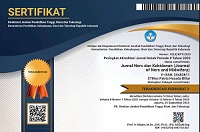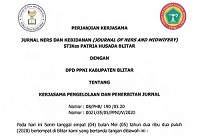Literature Review: The Support Needs of The Nurse Mentors in Their Mentoring Role
DOI:
https://doi.org/10.26699/jnk.v10i2.ART.p288-301Keywords:
mentoring role, mentorship, nurse mentors, support needsAbstract
In order to develop effective mentoring programme, it is important to identify the needs of the nurse mentors. A lot has been documented about the needs of the nurse mentees, however, there is a dearth of recent literature finding the support needs of the nurse mentors. The aim of this integrative review was to synthesize the literature on the support needs of the nurse mentors in their mentoring role. The search was steered across Cumulative Index to Nursing and Allied Health Literature; Direct of Open Access Journals; Google Scholar, PubMed/MEDLINE, Science Direct, and SCOPUS, in order to identify challenges and support that need to provide to the nurse mentors in their mentoring role. The Medical Subject Headings according to National Library of Medicine was used to search for the key concepts. Key search concepts were entered into the query box on the main PubMed page and searched. The search details page was check to determine how PubMed processed the search. The same concepts were used on the database to search for the articles which were included in this review. Seven subthemes, twenty categories were identified and classified into two main themes: Challenges to effective mentoring; Support needed by the nurse mentors. The review identifies challenges faced by nurse mentors and concludes that they need support. This study suggests that policy makers should make a concerted effort by availing resources for mentoring role. Workshops to equip mentors and collaboration between different stakeholders might help to enhance the support of the nurse mentors. Future research should analyse collaboration in support of the nurse mentors in their mentoring role
References
Bennett, M., & McGowan, B. (2014). Assessment matters—mentors need support in their role. British journal of nursing, 23(9), 454-458. https://doi.org/10.12968/bjon.2014.23.9.454
Broadbent, M., Moxham, L., Sander, T., Walker, S., & Dwyer, T. (2014). Supporting bachelor of nursing students within the clinical environment: Perspectives of preceptors. Nurse Education in Practice, 14(4), 403-409. https://doi.org/10.1016/j.nepr.2013.12.003
CASP C (2018) CASP qualitative checklist. Critical Appraisal Skills Programme. Available on http s://casp-uk.net/wp-content/uploads/2018/01/CASP-Qualitative-Checklist-2018. Pdf accessed 2023/02/18
Chan, H. Y., So, W. K., Aboo, G., Sham, A. S., Fung, G. S., Law, W. S., ... & Chair, S. Y. (2019). Understanding the needs of nurse preceptors in acute hospital care setting: A mixed-method study. Nurse education in practice, 38, 112-119. https://doi.org/10.1016/j.nepr.2019.06.013
Chen, F., Liu, Y., Wang, X., & Dong, H. (2021). Transition shock, preceptor support and nursing competency among newly graduated registered nurses: A cross-sectional study. Nurse Education Today, 102, 104891. https://doi.org/10.1016/j.nedt.2021.104891
Clark, L., & Casey, D. (2016). Support for mentors—an exploration of the issues. British Journal of Nursing, 25(20), 1095-1100. https://doi.org/10.12968/bjon.2016.25.20.1095
Cross, M., Lee, S., Bridgman, H., Thapa, D. K., Cleary, M., & Kornhaber, R. (2019). Benefits, barriers and enablers of mentoring female health academics: An integrative review. PloS one, 14(4), e0215319. https://doi.org/10.1371/journal.pone.0215319
Dirks, J. L. (2021). Alternative approaches to mentoring. Critical care nurse, 41(1), e9-e16. https://doi.org/10.4037/ccn2021789
Duchscher, J. E. B. (2009). Transition shock: The initial stage of role adaptation for newly graduated registered nurses. Journal of advanced nursing, 65(5), 1103-1113. https://doi.org/10.1111/j.1365-2648.2008.04898.x
Fernandez, R., Sheppard-Law, S., Curtis, S., Bancroft, J., & Smith, W. (2018). Exploring the experiences of neophyte nurse mentors: A qualitative study. Nurse Education in Practice, 29, 76-81. https://doi.org/10.1016/j.nepr.2017.11.011
Foolchand, D., & Maritz, J. E. (2020). Experience of nurses regarding the clinical mentoring of student nurses in resource-limited settings. Health SA Gesondheid, 25. https://doi.org/10.4102/hsag.v25i0.1434
Fong, T. S., Hassan, Z., Kasa, M., Balang, R. V., & Abdullah, S. M. (2021). Exploring Mentoring Skills to Assist New Nurses: Mentors’ and Mentees’ Perspectives. Journal HRMARS, 11(14), 124-141. DOI:10.6007/IJARBSS/v11-i14/8534
Frankenberger, W. D., Roberts, K. E., Hutchins, L., & Froh, E. B. (2021). Experience of burnout among pediatric inpatient nurse preceptors. Nurse education today, 100, 104862.
https://doi.org/10.1016/j.nedt.2021.104862
Goodyear, C., & Goodyear, M. (2018). Supporting successful mentoring. Nursing Management, 49(4), 49-53. DOI: 10.1097/01.NUMA.0000531173.00718.06
Hale, R. (2018, July). Conceptualizing the mentoring relationship: An appraisal of evidence. In Nursing Forum (Vol. 53, No. 3, pp. 333-338). https://doi.org/10.1111/nuf.12259
Hunt, L. A., McGee, P., Gutteridge, R., & Hughes, M. (2016). Failing securely: The processes and support which underpin English nurse mentors' assessment decisions regarding under-performing students. Nurse Education Today, 39, 79-86. https://doi.org/10.1016/j.nedt.2016.01.011
Jokelainen, M., Jamookeeah, D., Tossavainen, K., & Turunen, H. (2013). Finnish and British mentors' conceptions of facilitating nursing students' placement learning and professional development. Nurse education in practice, 13(1), 61-67. https://doi.org/10.1016/j.nepr.2012.07.008
Kalpazidou Schmidt, E., & Faber, S. T. (2016). Benefits of peer mentoring to mentors, female mentees and higher education institutions. Mentoring & Tutoring: Partnership in Learning, 24(2), 137-157. https://doi.org/10.1080/13611267.2016.1170560
Khunou, S. H. (2018). Nurse managers’ perception of mentoring community service nurses in North West Province, South Africa. African Journal of Biomedical Research, 21(3), 237-244. https://www.ajol.info/index.php/ajbr/article/view/181572
Khunou, S. H. (2019). Community service nurses’ experiences regarding mentoring in South Africa. Afr J Nurs Midwifery, 21(1), 1-6. https://journals.co.za/doi/abs/10.25159/2520-5293/4267
Khunou, S. H. (2023). Mentoring community service nurses in public health settings: Guidelines for nurse managers. Health SA Gesondheid, 28, 1883. https://journals.co.za/doi/full/10.4102/hsag.v28i0.1883
Kramer, D. S., McCue, V. Y., Butler, E., Prentiss, A. S., Ojeda, M. M., Tugg, K. K., ... & Bonet, S. (2021). The Art of Nurse Mentoring: A Framework of Support. Nursing & Health Sciences Research Journal, 4(1), 16-25. https://doi.org/10.55481/2578-3750.1097
Lapointe, É., & Vandenberghe, C. (2017). Supervisory mentoring and employee affective commitment and turnover: The critical role of contextual factors. Journal of Vocational Behavior, 98, 98-107. https://doi.org/10.1016/j.jvb.2016.10.004
Macey, A., Green, C., & Jarden, R. J. (2021). ICU nurse preceptors’ perceptions of benefits, rewards, supports and commitment to the preceptor role: a mixed-methods study. Nurse Education in Practice, 51, 102995. https://doi.org/10.1016/j.nepr.2021.102995
MacLaren, J. A. (2018). Supporting nurse mentor development: An exploration of developmental constellations in nursing mentorship practice. Nurse education in practice, 28, 66-75. https://doi.org/10.1016/j.nepr.2017.09.014
Matlhaba, K. L., & Khunou, S. H. (2022). Transition of graduate nurses from student to practice during the COVID-19 pandemic: Integrative review. International Journal of Africa Nursing Sciences, 100501. https://doi.org/10.1016/j.ijans.2022.100501
McIntosh, A., Gidman, J., & Smith, D. (2014). Mentors' perceptions and experiences of supporting student nurses in practice. International journal of nursing practice, 20(4), 360-365. https://doi.org/10.1111/ijn.12163
Mikkonen, K., Tomietto, M., Tuomikoski, A. M., Miha KauÄiÄ, B., Riklikiene, O., Vizcayaâ€Moreno, F., ... & Kääriäinen, M. (2022). Mentors' competence in mentoring nursing students in clinical practice: Detecting profiles to enhance mentoring practices. Nursing Open, 9(1), 593-603. https://doi.org/10.1002/nop2.1103
Moher, D., Liberati, A. & Tetzlaff, J. (2009) Preferred reporting items for systematic reviews and meta-analyses: The PRISMA statement, PLOS Medicine 6(2009):1–6. https://doi.org/10.3736/jcim20090918
Moran, M., & Banks, D. (2016). An exploration of the value of the role of the mentor and mentoring in midwifery. Nurse education today, 40, 52-56. https://doi.org/10.1016/j.nedt.2016.02.010
Mubeezi, M. P., & Gidman, J. (2017). Mentoring student nurses in Uganda: A phenomenological study of mentors’ perceptions of their own knowledge and skills. Nurse education in practice, 26, 96-101. https://doi.org/10.1016/j.nepr.2017.07.010
Ntho, T. A., Pienaar, A. J., & Sehularo, L. A. (2020). Peer-mentees’ challenges in an undergraduate peer-group clinical mentoring programme in a nursing education institution. Health SA Gesondheid, 25. https://doi.org/10.4102/hsag.v25i0.1435
Oluchina, S., & Gitonga, L. K. (2016). Factors hindering formal and informal nursing mentorship programs in Kenyan public universities. Am J Health Res, 4, 23-29. doi: 10.11648/j.ajhr.20160402.12
Panzavecchia, L., & Pearce, R. (2014). Are preceptors adequately prepared for their role in supporting newly qualified staff?. Nurse education today, 34(7), 1119-1124.
https://doi.org/10.1016/j.nedt.2014.03.001
Rakhudu, M. A., Davhana-Maselesele, M., & Useh, U. (2016). Concept analysis of collaboration in implementing problem-based learning in nursing education. Curationis, 39(1), 1-13. https://hdl.handle.net/10520/EJC195860
Rooke, N. (2014). An evaluation of nursing and midwifery sign off mentors, new mentors and nurse lecturers' understanding of the sign off mentor role. Nurse education in practice, 14(1), 43-48. https://doi.org/10.1016/j.nepr.2013.04.015
Roseghini, M., & Olson, S. (2015). What do midwives think about midwifery supervision?. British Journal of Midwifery, 23(9), 660-665. https://doi.org/10.12968/bjom.2015.23.9.660
Scott, E. S., & Smith, S. D. (2008). Group mentoring: a transition-to-work strategy. Journal for Nurses in Professional Development, 24(5), 232-238. DOI: 10.1097/01.NND.0000320691.24135.72
Staykova, M. P., Huson, C., & Pennington, D. (2013). Empowering nursing preceptors to mentoring undergraduate senior students in acute care settings. Journal of Professional Nursing, 29(5), e32-e36. https://doi.org/10.1016/j.profnurs.2013.06.003
The Joanna Briggs Institute (Producer). (2017). The Joanna Briggs Institute Critical Appraisal Tools for Use of in JBI Systematic Review. Checklist for Cross-Sectional Studies. Available online: https://jbi.global/sites/default/files/2019-05/JBI_Critical_Appraisal Checklist_for_Analytical_Cross_Sectional_Studies2017_0.pdf (accessed on 18 February 2023).
The Joanna Briggs Institute (Producer). (2017). The Joanna Briggs Institute Critical Appraisal Tools for Use of in JBI Systematic Review. Checklist for Qualitative Research. Available online:https://jbi.global/sites/default/files/2019-06/JBI_Critical_Appraisal Checklist_for_Qualitative_Research2017.docx (accessed on 18 February 2023).
Thompson, J. R., Bradley, V. J., Buntinx, W. H., Schalock, R. L., Shogren, K. A., Snell, M. E., ... & Yeager, M. H. (2009). Conceptualizing supports and the support needs of people with intellectual disability. Intellectual and developmental disabilities, 47(2), 135-146. https://doi.org/10.1352/1934-9556-47.2.135
Toronto, C. E., & Remington, R. (Eds.). (2020). A step-by-step guide to conducting an integrative review (pp. 1-9). Cham: Springer International Publishing. https://wayf.springernature.com/?redirect_uri=https%3A%2F%2Flink.springer.com%2Fbook%2F10.1007%2F978-3-030-37504-1
Tourigny, L., & Pulich, M. (2005). A critical examination of formal and informal mentoring among nurses. The health care manager, 24(1), 68-76. https://journals.lww.com/healthcaremanagerjournal/toc/2005/01000
Tuomikoski, A. M., Ruotsalainen, H., Mikkonen, K., Miettunen, J., & Kääriäinen, M. (2018). The competence of nurse mentors in mentoring students in clinical practice–A cross-sectional study. Nurse education today, 71, 78-83. https://doi.org/10.1016/j.nedt.2018.09.008
Voss, J. G., Alfes, C. M., Clark, A., Lilly, K. D., & Moore, S. (2022). Why mentoring matters for new graduates transitioning to practice: Implications for nurse leaders. Nurse Leader, 20(4), 399-403. https://doi.org/10.1016/j.mnl.2022.01.003
Weimer, K. R. (2021). Mentor Identification, Selection, Preparation, and Development: A Literature Review. Update: Applications of Research in Music Education, 39(3), 20-28. https://doi.org/10.1177/8755123320965138
Whittemore, R., & Knafl, K. (2005). The integrative review: updated methodology. Journal of advanced nursing, 52(5), 546-553. https://doi.org/10.1111/j.1365-2648.2005.03621.x
Wissemann, K., Bloxsome, D., De Leo, A., & Bayes, S. (2022). What are the benefits and challenges of mentoring in midwifery? An integrative review. Women's Health, 18, 17455057221110141. https://doi.org/10.1177/17455057221110141
Zhang, Y. P., Huang, X., Xu, S. Y., Xu, C. J., Feng, X. Q., & Jin, J. F. (2019). Can a one-on-one mentorship program reduce the turnover rate of new graduate nurses in China? A longitudinal study. Nurse Education in Practice, 40, 102616. https://doi.org/10.1016/j.nepr.2019.08.010
Downloads
Published
How to Cite
Issue
Section
License
Copyright (c) 2023 Jurnal Ners dan Kebidanan (Journal of Ners and Midwifery)

This work is licensed under a Creative Commons Attribution-ShareAlike 4.0 International License.






